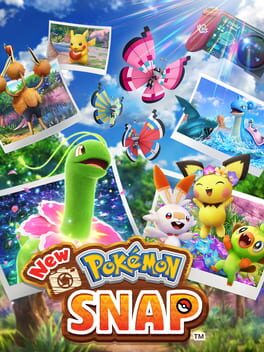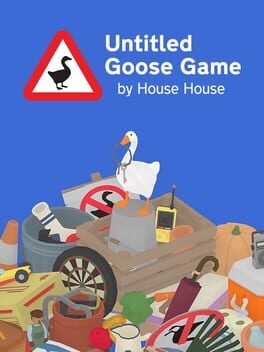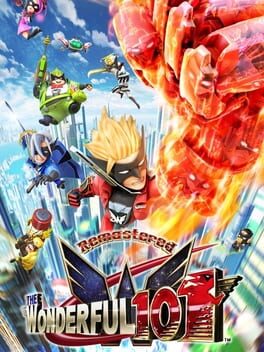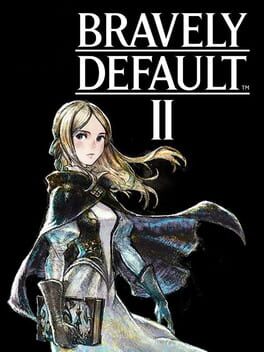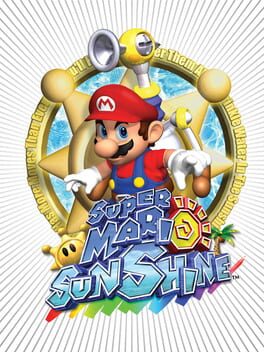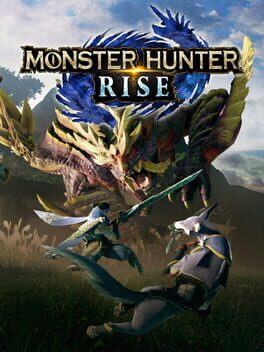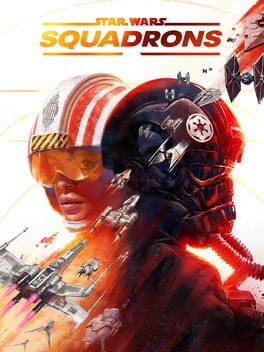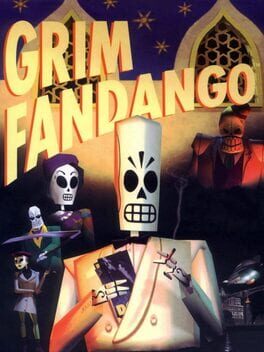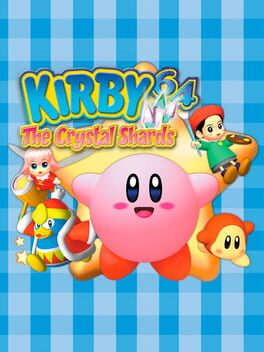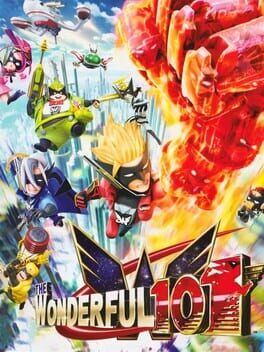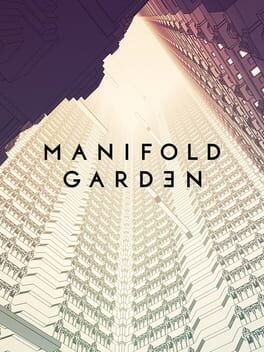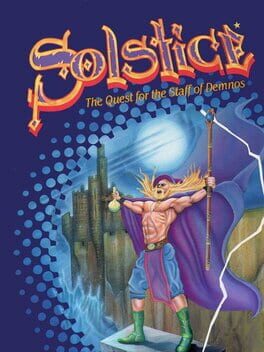WallsyBanger
BACKER
39 Reviews liked by WallsyBanger
New Pokémon Snap
2021
A Short Hike
2019
It's quite rare to see such an exemplar in game design in such a tight package. More specifically, A Short Hike is superb at exploration-based world design, making for a satisfying progression curve in just an hour and change. The game essentially gives the player the diameter of a circle to move about as they please, until they find a feather to upgrade to Claire's flying, which tightens the diameter of the circle as the player progresses up the mountain. What's brilliant here is that there's more feathers in the world than needed to complete the game, which provides the player both with the sense that their progression is their own but also a laidback reassurance that the challenge can be overcome in the way that's most convenient to them. All of this fits in well with the cozy autumnal presentation and the lean and sincere story, which efficiently tells a message about appreciating life's smaller comforts while comforting the larger anxieties it can provide. While the game is arguably too slim to be truly impactful considering it's ambitions, it is nonetheless an expertly focused and crafted experience.
Untitled Goose Game
2019
Every time a difficult game is released, the argument resurfaces whether game reviewers need to demonstrate a baseline level of competence before their article is considered “valid”. The argument for this is that competency in a game demonstrates understanding, and understanding is a requirement for conveying knowledge. However, I don’t think things are so simple. Games can catch someone’s eye for a variety of reasons, so it’s important to include the different experiences for someone with preexisting competency and someone without it. This gap between the expert-level breakdown and the novice experience might be widest for action games made by Platinum, The Wonderful 101 being the prime example.
Even before players get their hands on the basics of combat, they’ll notice that they’re being rated after every encounter based on the completion time, combo level, and damage taken. This is a useful feature for expert players, who want to get the highest rank they can on the mission overall. However, for new players, seeing "consolation prize" or bronze ranks after every fight is incredibly demoralizing, and they have no way of knowing that these evaluations are even biased against them. Like most Platinum games, important moves are relegated to the shop, but players have no way of knowing how useful these skills will actually be unless they’ve played comparable action games, or have encountered enemies that are already balanced around their use. Even moreso, the utility of some of these moves goes almost entirely unexplained, with the most famous example being the game’s block ability, Unite Guts. The description is as follows: “A Unite Morph materialized from a soul. Time with an incoming attack to bounce the attack back”. The way this is phrased suggests that it functions as a parry, but this is untrue. Not only are some attacks unblockable, but the timing doesn’t matter, and what differentiates blockable attacks from unblockable ones is that they’re “blunt” instead of “stabbing”. Nowhere is this explained, and the information passes mostly through word-of-mouth by the experts, who insist that this didn’t need in-game explanation because the blob of jello the team forms would offer no resistance to a blade. While this defense immediately falls apart when you consider how much resistance jello affords to a “blunt” hammer, the question to be asked is why this isn’t just explained in the game. Depth is created by complex decision making, not coyness about the functionality of core mechanics, and this is a problem that extends to many of the game's core systems and skills. Forcing players to take hits they don’t understand, and be criticized with poor rankings, just creates a hostile mood which isn’t conducive to the excitement these games live or die on.
The whole “turning into jello” thing may have thrown some people for a loop, so to back up, The Wonderful 101’s combat doesn’t have you control one character, but the titular hundred-and-one at the same time. You form a crowd of little heroes, who unite up into different weapons with their own specialties. This is accomplished by drawing shapes with the right analog stick, like a circle for a fist, a line for a blade, and so on. It’s a system that works pretty well, but the fact that you may have anticipated that clause reveals the problem. When it comes to recognizing drawn shapes, the question isn’t “if” the system will ever mess up, it’s “how often”. And truly, it works 95% of the time, but that means that one in twenty attempted morphs will fail. Guns are mistaken as whips, gliders as fists, bombs as hammers, and while novel mechanics do deserve some leeway, one must remember that this is an action game that will gleefully make fun of you for any mistake with a low rank. Not only that, but after an unintended morph, your morphing energy depletes anyway, leaving you in a worse state than you were before. However, this is another criticism that expert players will dismantle by saying they’ve played enough to where it works 99% of the time, and that drawing skills are part of the game. They can also point out how having to draw quickly and use energy efficiently is a valid mechanic, to which I at least partly agree. The reason I don’t like it is because of how nebulous of a skill this is, only developing as a result of errors new players had no way of anticipating. It’s a fun system when you already understand it, but again, making mechanics hard for new players to even experiment with is not equivalent to depth, and The Wonderful 101’s combat will behave more as a finicky barrier to entry rather than the exciting possibility space it should be.
This is the point where fans would point out that the director himself considers the first playthrough to function as a tutorial, and that he anticipated people would initially find the controls finicky and the skills opaque, but this is exactly my point. Is The Wonderful 101 actually that much more complex than other action games? Is the drawing system really as reliable as it could be? Would it be impossible to explain the basics of its mechanics on the first playthrough? The answer to all questions is “no”, so I have to question why this excuse is considered so bulletproof among action fans. I myself agree that one of the major joys of action games is in the discovery, but there’s a difference between giving players a comprehensive overview of the fundamentals while letting them discover the possibilities on their own, and simply failing to explain the basics and criticizing players for not knowing them already.
To wrap up this review, which is possibly the rantiest I’ve ever posted, I would like to note a couple things. Firstly, that I don’t intend to give the impression that this game is just terrible. There’s a reason why it has such a cult following, the people who really understand it can have a great time. It’s also not that anyone who isn’t an action game fan shouldn’t play this, but they will probably feel like they’re being repeatedly slapped in the face for trying to do so. It's to the point where even games analysts who praise the game's perfection and the importance of discovery will, somewhat hypocritically, post hour-long tutorials on how new players could even begin to enjoy themselves. As for myself, I had barely played any action games before my first try at The Wonderful 101, and quit about 70% of the way through for exactly this reason. By the time I went back and completed the HD version on PC, I had beaten the following action games:
Devil May Cry 1/2/3/4/5, Bayonetta 1/2, God Hand, Metal Gear Rising, P.N. 03, Nier Automata, Killer is Dead, Nioh, Viewtiful Joe, Vanquish, and Sekiro
… and even then, with more action game experience than 95% of players would ever have, The Wonderful 101 still felt insultingly obtuse at times. We, as the people who enjoy action games, shouldn’t just accept this sort of mediocrity because it’s the kind that resonates with us. Saying that the first sixteen-hour-long playthrough is supposed to be a frustrating tutorial, and that people should just git gud, kills interest in the genre and hurts everyone. And if The Wonderful 101 is trying to teach us anything, it’s that we’re stronger when we work together.
Even before players get their hands on the basics of combat, they’ll notice that they’re being rated after every encounter based on the completion time, combo level, and damage taken. This is a useful feature for expert players, who want to get the highest rank they can on the mission overall. However, for new players, seeing "consolation prize" or bronze ranks after every fight is incredibly demoralizing, and they have no way of knowing that these evaluations are even biased against them. Like most Platinum games, important moves are relegated to the shop, but players have no way of knowing how useful these skills will actually be unless they’ve played comparable action games, or have encountered enemies that are already balanced around their use. Even moreso, the utility of some of these moves goes almost entirely unexplained, with the most famous example being the game’s block ability, Unite Guts. The description is as follows: “A Unite Morph materialized from a soul. Time with an incoming attack to bounce the attack back”. The way this is phrased suggests that it functions as a parry, but this is untrue. Not only are some attacks unblockable, but the timing doesn’t matter, and what differentiates blockable attacks from unblockable ones is that they’re “blunt” instead of “stabbing”. Nowhere is this explained, and the information passes mostly through word-of-mouth by the experts, who insist that this didn’t need in-game explanation because the blob of jello the team forms would offer no resistance to a blade. While this defense immediately falls apart when you consider how much resistance jello affords to a “blunt” hammer, the question to be asked is why this isn’t just explained in the game. Depth is created by complex decision making, not coyness about the functionality of core mechanics, and this is a problem that extends to many of the game's core systems and skills. Forcing players to take hits they don’t understand, and be criticized with poor rankings, just creates a hostile mood which isn’t conducive to the excitement these games live or die on.
The whole “turning into jello” thing may have thrown some people for a loop, so to back up, The Wonderful 101’s combat doesn’t have you control one character, but the titular hundred-and-one at the same time. You form a crowd of little heroes, who unite up into different weapons with their own specialties. This is accomplished by drawing shapes with the right analog stick, like a circle for a fist, a line for a blade, and so on. It’s a system that works pretty well, but the fact that you may have anticipated that clause reveals the problem. When it comes to recognizing drawn shapes, the question isn’t “if” the system will ever mess up, it’s “how often”. And truly, it works 95% of the time, but that means that one in twenty attempted morphs will fail. Guns are mistaken as whips, gliders as fists, bombs as hammers, and while novel mechanics do deserve some leeway, one must remember that this is an action game that will gleefully make fun of you for any mistake with a low rank. Not only that, but after an unintended morph, your morphing energy depletes anyway, leaving you in a worse state than you were before. However, this is another criticism that expert players will dismantle by saying they’ve played enough to where it works 99% of the time, and that drawing skills are part of the game. They can also point out how having to draw quickly and use energy efficiently is a valid mechanic, to which I at least partly agree. The reason I don’t like it is because of how nebulous of a skill this is, only developing as a result of errors new players had no way of anticipating. It’s a fun system when you already understand it, but again, making mechanics hard for new players to even experiment with is not equivalent to depth, and The Wonderful 101’s combat will behave more as a finicky barrier to entry rather than the exciting possibility space it should be.
This is the point where fans would point out that the director himself considers the first playthrough to function as a tutorial, and that he anticipated people would initially find the controls finicky and the skills opaque, but this is exactly my point. Is The Wonderful 101 actually that much more complex than other action games? Is the drawing system really as reliable as it could be? Would it be impossible to explain the basics of its mechanics on the first playthrough? The answer to all questions is “no”, so I have to question why this excuse is considered so bulletproof among action fans. I myself agree that one of the major joys of action games is in the discovery, but there’s a difference between giving players a comprehensive overview of the fundamentals while letting them discover the possibilities on their own, and simply failing to explain the basics and criticizing players for not knowing them already.
To wrap up this review, which is possibly the rantiest I’ve ever posted, I would like to note a couple things. Firstly, that I don’t intend to give the impression that this game is just terrible. There’s a reason why it has such a cult following, the people who really understand it can have a great time. It’s also not that anyone who isn’t an action game fan shouldn’t play this, but they will probably feel like they’re being repeatedly slapped in the face for trying to do so. It's to the point where even games analysts who praise the game's perfection and the importance of discovery will, somewhat hypocritically, post hour-long tutorials on how new players could even begin to enjoy themselves. As for myself, I had barely played any action games before my first try at The Wonderful 101, and quit about 70% of the way through for exactly this reason. By the time I went back and completed the HD version on PC, I had beaten the following action games:
Devil May Cry 1/2/3/4/5, Bayonetta 1/2, God Hand, Metal Gear Rising, P.N. 03, Nier Automata, Killer is Dead, Nioh, Viewtiful Joe, Vanquish, and Sekiro
… and even then, with more action game experience than 95% of players would ever have, The Wonderful 101 still felt insultingly obtuse at times. We, as the people who enjoy action games, shouldn’t just accept this sort of mediocrity because it’s the kind that resonates with us. Saying that the first sixteen-hour-long playthrough is supposed to be a frustrating tutorial, and that people should just git gud, kills interest in the genre and hurts everyone. And if The Wonderful 101 is trying to teach us anything, it’s that we’re stronger when we work together.
Bravely Default II
2021
Bravely Default II, much like its predecessors, is a game that's not afraid to wear its influences on its shoulders. It's quite clear that the age old "4 Heroes of Light" trope along with the collection of crystals to save the world is a plotline that's all too familiar and trite. It would be quite easy to dismiss this game as nothing more than a "by-the-numbers" RPG, but it's anything but, I believe. Granted, as of writing this review, I have not played the previous two entries, but after finishing this game, I am quite excited to delve into them soon enough. While the set-up and story overall isn't anything new or extraordinary, its the game's presentation that won me over.
I'll be honest, when I first booted this up, it was kind of a slowburn. The chibi-like character models felt off, the open world felt a bit empty and plain, and the set-up was all too familiar, as I've mentioned. Once jobs started getting introduced, I actually felt intimdated because this actually the first JRPG I've played with a job system, so I wasn't sure how confusing it would get. But more on that later. In the meantime, the more I played, the more I found myself drawn to the world and the characters. I came to love the chibi aesthetic and the sometimes over-the-top European accents and character quirks. Elvis in particular became the ideal buddy in my mind. A nice fellow I wish I could share a drink with. It's hard to explain what exactly made a lot of things in this game click for me, but they eventually did sooner rather than later and I'm glad they did.
As I mentioned the game features a job system which threw me off at first, but the more jobs I acquired, the more options were available to experiment with. See, I realize now that games like this rely more on your set-up strategy rather than just leveling up. It's easy enough to just cheese your way through most bosses wigth the right skills and job classes equipped. Of course, a lot of people may prefer the challenge of actually beating bosses without the use of cheap tactics, but the option is there. I for one found it really fun to exploit weaknesses and use them to my advantage. It feels like breaking the game, in a good way. It kind of scratched an itch I never realized I had. See, classics like Final Fantasy III and V seemed intimidating due to their job system, but I'm excited to try them out properly after enjoying my time with this. I've heard the battle system was changed somewhat from the previous two games, so I'll expand on that later on once I finish them, but I really enjoyed it and unlike most RPGs, I actually didn't feel bothered when I had to grind.
As I said in the beginning, the presentation is what won me over, and while I do think the majority of the enjoyment here lies within its gameplay and versatile job system, I feel like the direction they went with the clichéd story employed enough twists and intense moments to make it interesting. And this was also thanks to the vibrant cast of heroes and side characters alike, most of which I really liked. On that note, I really loved how sidequests were handled. Sure, you've got your generic fetch quests and "defeat x amount of monsters" quests. But sprinkled throughout are more in depth quests that add cutscenes and plot for the purposes of character development, which made hunting for sidequests feel all the more fun and worthwhile. Some of these led to some legitmately heartfelt moments that made me love the characters that much more.
Looking at this game with a more critical lens makes me aware that it isn't breaking any ground or accomplishing anything extraordinary, but with the amount of charm it has and how much fun I had with the boss fights, I can't help but admit it's become one of my favorite JRPGs of all time. I'll be sure to update this review with some comparisons once I beat the first 2 games, but personally, this was a great introduction to the series and I'm glad I gave it a chance.
I'll be honest, when I first booted this up, it was kind of a slowburn. The chibi-like character models felt off, the open world felt a bit empty and plain, and the set-up was all too familiar, as I've mentioned. Once jobs started getting introduced, I actually felt intimdated because this actually the first JRPG I've played with a job system, so I wasn't sure how confusing it would get. But more on that later. In the meantime, the more I played, the more I found myself drawn to the world and the characters. I came to love the chibi aesthetic and the sometimes over-the-top European accents and character quirks. Elvis in particular became the ideal buddy in my mind. A nice fellow I wish I could share a drink with. It's hard to explain what exactly made a lot of things in this game click for me, but they eventually did sooner rather than later and I'm glad they did.
As I mentioned the game features a job system which threw me off at first, but the more jobs I acquired, the more options were available to experiment with. See, I realize now that games like this rely more on your set-up strategy rather than just leveling up. It's easy enough to just cheese your way through most bosses wigth the right skills and job classes equipped. Of course, a lot of people may prefer the challenge of actually beating bosses without the use of cheap tactics, but the option is there. I for one found it really fun to exploit weaknesses and use them to my advantage. It feels like breaking the game, in a good way. It kind of scratched an itch I never realized I had. See, classics like Final Fantasy III and V seemed intimidating due to their job system, but I'm excited to try them out properly after enjoying my time with this. I've heard the battle system was changed somewhat from the previous two games, so I'll expand on that later on once I finish them, but I really enjoyed it and unlike most RPGs, I actually didn't feel bothered when I had to grind.
As I said in the beginning, the presentation is what won me over, and while I do think the majority of the enjoyment here lies within its gameplay and versatile job system, I feel like the direction they went with the clichéd story employed enough twists and intense moments to make it interesting. And this was also thanks to the vibrant cast of heroes and side characters alike, most of which I really liked. On that note, I really loved how sidequests were handled. Sure, you've got your generic fetch quests and "defeat x amount of monsters" quests. But sprinkled throughout are more in depth quests that add cutscenes and plot for the purposes of character development, which made hunting for sidequests feel all the more fun and worthwhile. Some of these led to some legitmately heartfelt moments that made me love the characters that much more.
Looking at this game with a more critical lens makes me aware that it isn't breaking any ground or accomplishing anything extraordinary, but with the amount of charm it has and how much fun I had with the boss fights, I can't help but admit it's become one of my favorite JRPGs of all time. I'll be sure to update this review with some comparisons once I beat the first 2 games, but personally, this was a great introduction to the series and I'm glad I gave it a chance.
Super Mario Sunshine
2002
Monster Hunter Rise
2021
I feel bad about expressing my thoughts on Monster Hunter Rise, because even in the incomplete portion I've played, it's clear that this will disappoint some longtime franchise veterans with how it smoothes away the bumps and frictions that I'm sure are divisive to some people. I'm sure there will be people who look at me saying "the combat is so much more fun" with the same weary resignation that I have for comments about NieR Numbers having "better combat".
And yet, it can't really be denied: after multiple failed attempts to get into it over the years, from 3 Ultimate on the Wii U to World on the PC, this is the moment Monster Hunter finally clicked for me. Each hunt is a fast, smooth experience, slinging through the map to fight fun bosses with unique patterns and movesets alongside my friends, each one styling on the monster in their own unique way. The Spiderman web swinging is a godsend, making movement in these games fun for the first time, whilst preserving the weight of the actual combat. Said combat is as thrilling as the high points of World, the concentrated joy of Boss Battle after Boss Battle with so little resistance in between.
It's great fun, by myself or with friends. Alone, I can appreciate the unique patterns and attacks the monsters have, and the windows in them for me to attack remain deliciously satisfying to slip through in spite of their forgiving width. With friends, Monster Hunter lets me enjoy my friends, their company, and their flair and individuality in a way that few other games allow so quickly and easily.
However, this is all a smokescreen. The real reason, the true, fundamental reason I couldn't get into Monster Hunter World, is that the outfits were awful. Terrible. I wouldn't be caught dead in them. What reason do I have to grind out a monster if wearing its skin is just going to make me look like a clown? Thankfully, Capcom has heard my plight, and the outfits here are worth becoming a monstrous destroyer of nature for, which is really what matters most in Monster Hunter.
The battle is temporary. The fashion is eternal.
And yet, it can't really be denied: after multiple failed attempts to get into it over the years, from 3 Ultimate on the Wii U to World on the PC, this is the moment Monster Hunter finally clicked for me. Each hunt is a fast, smooth experience, slinging through the map to fight fun bosses with unique patterns and movesets alongside my friends, each one styling on the monster in their own unique way. The Spiderman web swinging is a godsend, making movement in these games fun for the first time, whilst preserving the weight of the actual combat. Said combat is as thrilling as the high points of World, the concentrated joy of Boss Battle after Boss Battle with so little resistance in between.
It's great fun, by myself or with friends. Alone, I can appreciate the unique patterns and attacks the monsters have, and the windows in them for me to attack remain deliciously satisfying to slip through in spite of their forgiving width. With friends, Monster Hunter lets me enjoy my friends, their company, and their flair and individuality in a way that few other games allow so quickly and easily.
However, this is all a smokescreen. The real reason, the true, fundamental reason I couldn't get into Monster Hunter World, is that the outfits were awful. Terrible. I wouldn't be caught dead in them. What reason do I have to grind out a monster if wearing its skin is just going to make me look like a clown? Thankfully, Capcom has heard my plight, and the outfits here are worth becoming a monstrous destroyer of nature for, which is really what matters most in Monster Hunter.
The battle is temporary. The fashion is eternal.
Star Wars: Squadrons
2020
The main plot is unremarkable and the characters have seeds of interesting stories in them but are otherwise thin, and not helped by wooden animation and inconsistent voice acting. It would have been less jarring to have 2D character portraits, and frankly more interesting to look at. There's a laudable attempt at diversity within the cast, but the Asian pilot, with a throwaway line about his husband, is still working for the Galactic Empire - whose governing ideology is one of human supremacy. This is rarely explicitly stated in media outside of the pre-Disney books, and I'm not surprised to see it elided again, but this had potential for more adventurous writing than "gay people of colour can do war crimes, too, in a universe where the homophobias and racisms of the real world don't exist".
I actually did enjoy the overall pacing, and chatting to people between missions in the hangar and ready room. The engine itself seems like a great foundation for story-telling! I would love to see what modders could do with this, but this is an EA joint so expectations are sadly low.
I don't think I can really review the piloting as I'd like because I don't have a joystick. It was certainly playable with a gamepad. However, the control binding menus were very robust, including the Laser/Shields/Engine distribution keys - I think it's quite clear a lot of people from the X-Wing vs TIE Fighters days were listened to it, with good effect.
I've never been much for deathmatch/dogfights, so I've mostly played the Fleet Battles mode, in which there is a sort of soft-coded ebb/tide of territory based on your team's performance, and victory is defined by taking out the capital ships rather than First To X Kills. Did I play well? Did I know what I was doing? Did I research strategies? I did none of these things and I still had a good time.
I was also pleasantly surprised that they added custom servers, with the ability to make granular changes to the game (e.g.damage/health for both starfighters and capital ships). Now go the whole hog and let us trigger serverwide soundboards with allchat commands.
Overall, as much as they could with a relatively niche genre within a multi-billion dollar IP, the developers really have tried to avoid making something with barebones features and a sterile matchmaking environment, and their update posts give me the impression they want to maintain it and create something longlasting. It's a good video game I should pick it up again actually. They have B-wings now! B-wings!!!
I actually did enjoy the overall pacing, and chatting to people between missions in the hangar and ready room. The engine itself seems like a great foundation for story-telling! I would love to see what modders could do with this, but this is an EA joint so expectations are sadly low.
I don't think I can really review the piloting as I'd like because I don't have a joystick. It was certainly playable with a gamepad. However, the control binding menus were very robust, including the Laser/Shields/Engine distribution keys - I think it's quite clear a lot of people from the X-Wing vs TIE Fighters days were listened to it, with good effect.
I've never been much for deathmatch/dogfights, so I've mostly played the Fleet Battles mode, in which there is a sort of soft-coded ebb/tide of territory based on your team's performance, and victory is defined by taking out the capital ships rather than First To X Kills. Did I play well? Did I know what I was doing? Did I research strategies? I did none of these things and I still had a good time.
I was also pleasantly surprised that they added custom servers, with the ability to make granular changes to the game (e.g.damage/health for both starfighters and capital ships). Now go the whole hog and let us trigger serverwide soundboards with allchat commands.
Overall, as much as they could with a relatively niche genre within a multi-billion dollar IP, the developers really have tried to avoid making something with barebones features and a sterile matchmaking environment, and their update posts give me the impression they want to maintain it and create something longlasting. It's a good video game I should pick it up again actually. They have B-wings now! B-wings!!!
Untitled Goose Game
2019
Grim Fandango
1998
it shone, pale as bone,
as i stood there, alone,
and thought to myself,
how the moon
that night, cast its light
on my heart's true delight
and the reef
where her body
was strewn.
playing without a guide open seems dangerous and ahistorical to me. amazing, iconic game, one of the all-time greats. can't stress enough, though, that you should be looking up the puzzle solutions whenever you're stuck for more than two minutes. that's how it's meant to be played!
as i stood there, alone,
and thought to myself,
how the moon
that night, cast its light
on my heart's true delight
and the reef
where her body
was strewn.
playing without a guide open seems dangerous and ahistorical to me. amazing, iconic game, one of the all-time greats. can't stress enough, though, that you should be looking up the puzzle solutions whenever you're stuck for more than two minutes. that's how it's meant to be played!
There's a moment at the end of world 2 where a cutscene plays, with the whole crew in a desert as Kirby lags behind, desperate for food as they then imagine their friends as said items. Of course, Adeleine makes food for everyone with her paintings and they have a nice picnic right there.
It's that kind of heartwarming, powerful energy that runs through the whole experience. This friendly, childlike pleasantry as you go across the galaxy with fun poplike music playing through the speakers, as your friends join you in a great amount of the levels to assist you. Whether that be sledding with waddle dee to king dedede himself helping you across lava chasms there's always a strong aura that feels like one very warm hug. If anything the only small issue is just that sometimes the game reminds you that it's a little old and shakes your attention by forcing you to grab a powerup twice from a completely different area for the true ending. But even still, the whole playthrough is rather forgiving, in that you can actually get a powerup mid-level, quit out of the level, and still have that powerup on you, including all the crystals you got in the level so far!!
Crystal Shards is very much a nostalgic, but also genuine fav of the kirby games for me. I'll always think about that final level where The Squad helps you out one final time before Ribbon carries you as you rail shoot an utterly corrupted angelic entity that bleeds while the game pleads with you to Tough It Out!!!
It's that kind of heartwarming, powerful energy that runs through the whole experience. This friendly, childlike pleasantry as you go across the galaxy with fun poplike music playing through the speakers, as your friends join you in a great amount of the levels to assist you. Whether that be sledding with waddle dee to king dedede himself helping you across lava chasms there's always a strong aura that feels like one very warm hug. If anything the only small issue is just that sometimes the game reminds you that it's a little old and shakes your attention by forcing you to grab a powerup twice from a completely different area for the true ending. But even still, the whole playthrough is rather forgiving, in that you can actually get a powerup mid-level, quit out of the level, and still have that powerup on you, including all the crystals you got in the level so far!!
Crystal Shards is very much a nostalgic, but also genuine fav of the kirby games for me. I'll always think about that final level where The Squad helps you out one final time before Ribbon carries you as you rail shoot an utterly corrupted angelic entity that bleeds while the game pleads with you to Tough It Out!!!
Hades
2018
Hades was initially a game I kept an eye on, but wasn't sure if I wanted to buy. Hearing friends talk about the excitement they felt encouraged me to buy it for 5 dollars off on Black Friday sale over other games I was considering and I can tell you right now I was not disappointed!
From top to bottom, Hades is an excellent game. It gets you right into the action with the plot and gameplay as Zagreus, half-human son of Hades, seeking to escape the Underworld for reasons unknown. One thing I appreciate about this game is how it treats the player as intelligent, as it uses smart and strong conversation pieces to establish relationships and dynamics easily in a story you're essentially dropped in the middle of. It only takes 1 or 2 interactions to get a basic understanding of any character while at the same time having pleasurable depth to explore. The game hits the ground running.
Gameplay is crisp and responsive, playing similar to Transistor as an isometric action game but much more smoothly and refined. Dash mechanics have particularly been removed, making the cooldown between dashes feel smoother and reducing the "hitch" it felt like Transistor's dash had. There is a ton of variation for all kinds of playstyles to be represented thanks to not only the greek god's boons but also a multitude of varied weapons with different playstyles, special equippable trinkets to modify what you do, a simple talent tree and other systems which layer on top of a great feeling combat system to add substantial depth to it all. Slashing through hordes of enemies with the blade while timing dashes, your special and your cast is exhilarating and tense.
The rewards of the rooms offer interesting gameplay choices in a variety of ways. There were times I did a run or two without even planning to try to make it out, but instead prioritized nectar rooms for NPC advancement, gemstones for unlockables and so on. Risk-reward management is emphasized and smartly woven into the gameplay. You'll never be screwed over just for making a choice, but you will have to deal with trade-offs and consider situationals. The decision making aspect is also important for the early rooms, as once you advance in skill level they will provide much less threat. Having reasons to approach ordering differently or to consider trade-offs therefor helps keep these interesting even as you get stronger while not being overwhelming to newcomers. It all comes together into an addictive package that I found myself returning to repeatedly even when I booted up my Switch with the intent to play other games.
Layered on top of the top notch gameplay is a strong story, which unfolds over multiple attempts and victories. One way this game feeds into its addictive gameplay loop is by granting you bits of story or character progress with each run: Even if you're not making headway gameplay-wise you'll be making headway into the overall narrative or into getting to explore the characters more. The story itself is pretty nice and feels a lot like one might expect the image of a "greek mythology" story to feel like, it is certainly no coincidence that Sisyphus is an NPC here, which is obviously fitting with the setting. Combine it with top notch character design (all of the gods are some GREAT interpretations!) and snappy dialogue that is pretty much entirely voiced (and this game has a LOT of dialogue, so it is impressive!) and you get a real winner.
My favorite character is probably Achilles. His gentle, weary voice really fits the characterization of a dead warrior looking back at what he's done with a different perspective and you get into his head quite a bit because he is the author of the game's bestiary and glossary which gives more insight. I won't go more into spoilers, but you eventually get to interact with him in more intricate ways as well. Characters can range from the more comedic, like Skelly, to much more straight edge series like Thanatos and helps keep the interactions feeling fresh. But the game keeps a consistent tone thanks to filtering through Zagreus' view and the lovely narrator keeping his drolling voice going. It is all very well done.
I'd be remiss if I didn't mention the game's graphics and ESPECIALLY its soundtrack! This game has some really good music all around, first time I really noticed is in the first areas boss as "Scourge of the Furies" is a pretty killer boss theme and later on "The Bloodless" also particularly stuck out to me as great, which isn't really a surprise given one thing Supergiant Games has always done well is having killer soundtracks. Who knew lutes and banjos would mix so well with greek rocking? I'll also use this section to give a shout out to the voice actors who really bring the characters to life. From Ares' soft spoken and mild mannered sadism to Achilles' world weariness and Megaera's husky tones. Visually, the game has very lush background art, exceedingly detailed models (to the point where some of the detail can only be seen by zooming in), distinctive character designs and some striking visual effects on things like attacks and item pickups. Even through over 30 attempts it hasn't stopped looking reeeeeally pretty!
For a brief mention of things I found flawed: While the area one bosses get mixed up with time, you never get new bosses for areas two and three. Because of that it can feel a bit more stale at the end. Personally, I wish they had an alternate boss option for those areas for just a little mixing up. While I didn't have a problem with it, clearing the story DOES require multiple runs and that won't be something everyone enjoys. And while I haven't gotten that far, from what I know some of the post-end game dumps for resources are kind of ridiculous. And, yeah, that's about all I've got for issues!
In short: Hades is the kind of game where I recommend playing it and giving it a try even if you aren't a traditional fan of its genre. It blends story with roguelike gameplay in a rather unique manner, the action gameplay itself is incredibly fun and addictive, it has all the bells and whistles of great graphics and music, and I'd say there's little in the way of large flaws.
From top to bottom, Hades is an excellent game. It gets you right into the action with the plot and gameplay as Zagreus, half-human son of Hades, seeking to escape the Underworld for reasons unknown. One thing I appreciate about this game is how it treats the player as intelligent, as it uses smart and strong conversation pieces to establish relationships and dynamics easily in a story you're essentially dropped in the middle of. It only takes 1 or 2 interactions to get a basic understanding of any character while at the same time having pleasurable depth to explore. The game hits the ground running.
Gameplay is crisp and responsive, playing similar to Transistor as an isometric action game but much more smoothly and refined. Dash mechanics have particularly been removed, making the cooldown between dashes feel smoother and reducing the "hitch" it felt like Transistor's dash had. There is a ton of variation for all kinds of playstyles to be represented thanks to not only the greek god's boons but also a multitude of varied weapons with different playstyles, special equippable trinkets to modify what you do, a simple talent tree and other systems which layer on top of a great feeling combat system to add substantial depth to it all. Slashing through hordes of enemies with the blade while timing dashes, your special and your cast is exhilarating and tense.
The rewards of the rooms offer interesting gameplay choices in a variety of ways. There were times I did a run or two without even planning to try to make it out, but instead prioritized nectar rooms for NPC advancement, gemstones for unlockables and so on. Risk-reward management is emphasized and smartly woven into the gameplay. You'll never be screwed over just for making a choice, but you will have to deal with trade-offs and consider situationals. The decision making aspect is also important for the early rooms, as once you advance in skill level they will provide much less threat. Having reasons to approach ordering differently or to consider trade-offs therefor helps keep these interesting even as you get stronger while not being overwhelming to newcomers. It all comes together into an addictive package that I found myself returning to repeatedly even when I booted up my Switch with the intent to play other games.
Layered on top of the top notch gameplay is a strong story, which unfolds over multiple attempts and victories. One way this game feeds into its addictive gameplay loop is by granting you bits of story or character progress with each run: Even if you're not making headway gameplay-wise you'll be making headway into the overall narrative or into getting to explore the characters more. The story itself is pretty nice and feels a lot like one might expect the image of a "greek mythology" story to feel like, it is certainly no coincidence that Sisyphus is an NPC here, which is obviously fitting with the setting. Combine it with top notch character design (all of the gods are some GREAT interpretations!) and snappy dialogue that is pretty much entirely voiced (and this game has a LOT of dialogue, so it is impressive!) and you get a real winner.
My favorite character is probably Achilles. His gentle, weary voice really fits the characterization of a dead warrior looking back at what he's done with a different perspective and you get into his head quite a bit because he is the author of the game's bestiary and glossary which gives more insight. I won't go more into spoilers, but you eventually get to interact with him in more intricate ways as well. Characters can range from the more comedic, like Skelly, to much more straight edge series like Thanatos and helps keep the interactions feeling fresh. But the game keeps a consistent tone thanks to filtering through Zagreus' view and the lovely narrator keeping his drolling voice going. It is all very well done.
I'd be remiss if I didn't mention the game's graphics and ESPECIALLY its soundtrack! This game has some really good music all around, first time I really noticed is in the first areas boss as "Scourge of the Furies" is a pretty killer boss theme and later on "The Bloodless" also particularly stuck out to me as great, which isn't really a surprise given one thing Supergiant Games has always done well is having killer soundtracks. Who knew lutes and banjos would mix so well with greek rocking? I'll also use this section to give a shout out to the voice actors who really bring the characters to life. From Ares' soft spoken and mild mannered sadism to Achilles' world weariness and Megaera's husky tones. Visually, the game has very lush background art, exceedingly detailed models (to the point where some of the detail can only be seen by zooming in), distinctive character designs and some striking visual effects on things like attacks and item pickups. Even through over 30 attempts it hasn't stopped looking reeeeeally pretty!
For a brief mention of things I found flawed: While the area one bosses get mixed up with time, you never get new bosses for areas two and three. Because of that it can feel a bit more stale at the end. Personally, I wish they had an alternate boss option for those areas for just a little mixing up. While I didn't have a problem with it, clearing the story DOES require multiple runs and that won't be something everyone enjoys. And while I haven't gotten that far, from what I know some of the post-end game dumps for resources are kind of ridiculous. And, yeah, that's about all I've got for issues!
In short: Hades is the kind of game where I recommend playing it and giving it a try even if you aren't a traditional fan of its genre. It blends story with roguelike gameplay in a rather unique manner, the action gameplay itself is incredibly fun and addictive, it has all the bells and whistles of great graphics and music, and I'd say there's little in the way of large flaws.
The Wonderful 101
2013
A game that genuinely makes you feel happy to be alive. It's a masterpiece. The surprisingly great story for a Platinum game, punchy writing and creativity of Kamiya in both the playfulness of the combat and the variety in gimmicks leave this ending up as one of the greatest games ever made.
A rollercoaster ride that ends on one of the best quick time events in video-games PERIOD. Brings a tear to my eye every time.
A rollercoaster ride that ends on one of the best quick time events in video-games PERIOD. Brings a tear to my eye every time.
Manifold Garden
2019
The concept of objectivity when it comes to thinking about art is largely a myth. We all approach any piece of art with our own personal contexts, drawing from our own past experiences in our understanding of it. In my case, I came to Manifold Garden having already watched Jacob Geller's video The Shape of Infinity (arguably my favourite video from my favourite writer about videogames as an artform), and I don't doubt it strongly influenced my experience as a result.
That experience was one where you're thrown into boundless spaces, countless identical structures stretching eternally into the distance, making you feel dwarfed by the very notion of endlessness and then deciding to use that endlessness to your advantage. Where often the best way to reach places above you is to fall down to them. Where the very notion of what direction is even upwards becomes twisted, obscured; you end up seeing stairs or towers and assuming that means you stand right-way-up on this terrain, but these assumptions fall apart with the realisation this world is one not made for people, and as you shift gravity to turn hallways into diving shafts so you can plummet to your next location you start to question if it was really a hallway at all.
It's so hard for me not to see the game from this perspective of its reality-warping viewpoints, from how small it makes me feel, how much it has me confront the true nature of the infinite. That's with the context I'm coming at it from, but I also get that it would be easy to see it just as some neat, colourful puzzle game set in non-Euclidean spaces if you don't have the same context. Like I said, experiences with art come with associated prior experiences that build up to them, nothing we engage with exists in a vacuum. Anyways, watch that video beforehand if you intend to play this game, I think it made my time with the game meaningfully more enjoyable as a result.
https://www.youtube.com/watch?v=Zm5Ogh_c0Ig
Update; I do think, reflecting on it, that whilst the best moments of the game were wonderful for me they were also not super common in part due to how the block puzzles can at times drag the game back down to normality? It's hard for them not to feel mundane against the backdrop of wonder, and for that contrast to be disruptive. There were also a couple moments of intense frustration I had in the opening hour or so where the game was poor at communicating what it needed me to do. I was fairly forgiving about all this at the time since my favourite moments in the game were concentrated near the end, but it's definitely made the game hold up a bit less positively in my memory over the past week or so.
That experience was one where you're thrown into boundless spaces, countless identical structures stretching eternally into the distance, making you feel dwarfed by the very notion of endlessness and then deciding to use that endlessness to your advantage. Where often the best way to reach places above you is to fall down to them. Where the very notion of what direction is even upwards becomes twisted, obscured; you end up seeing stairs or towers and assuming that means you stand right-way-up on this terrain, but these assumptions fall apart with the realisation this world is one not made for people, and as you shift gravity to turn hallways into diving shafts so you can plummet to your next location you start to question if it was really a hallway at all.
It's so hard for me not to see the game from this perspective of its reality-warping viewpoints, from how small it makes me feel, how much it has me confront the true nature of the infinite. That's with the context I'm coming at it from, but I also get that it would be easy to see it just as some neat, colourful puzzle game set in non-Euclidean spaces if you don't have the same context. Like I said, experiences with art come with associated prior experiences that build up to them, nothing we engage with exists in a vacuum. Anyways, watch that video beforehand if you intend to play this game, I think it made my time with the game meaningfully more enjoyable as a result.
https://www.youtube.com/watch?v=Zm5Ogh_c0Ig
Update; I do think, reflecting on it, that whilst the best moments of the game were wonderful for me they were also not super common in part due to how the block puzzles can at times drag the game back down to normality? It's hard for them not to feel mundane against the backdrop of wonder, and for that contrast to be disruptive. There were also a couple moments of intense frustration I had in the opening hour or so where the game was poor at communicating what it needed me to do. I was fairly forgiving about all this at the time since my favourite moments in the game were concentrated near the end, but it's definitely made the game hold up a bit less positively in my memory over the past week or so.
